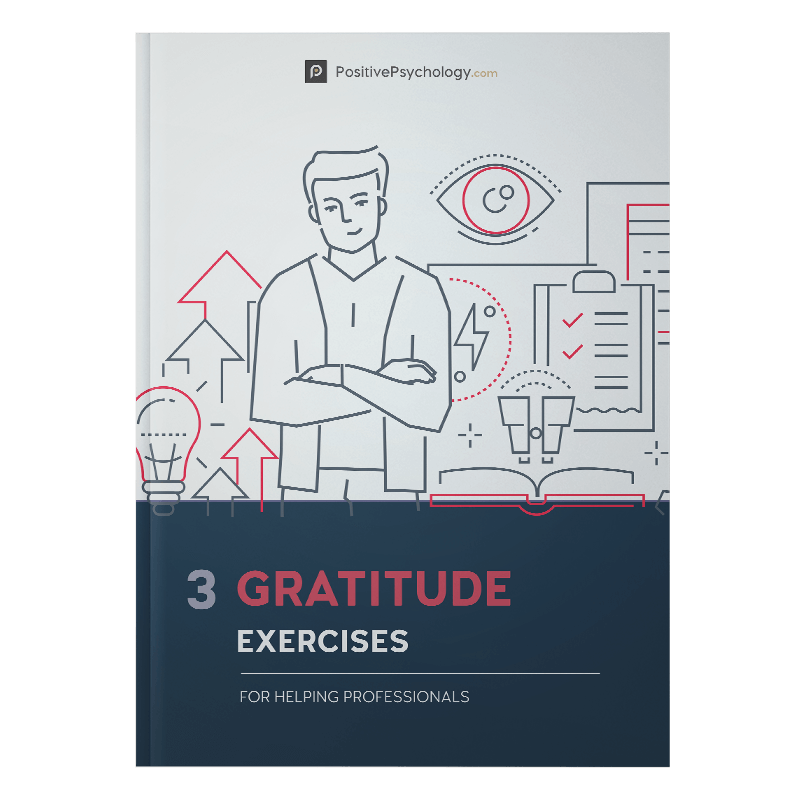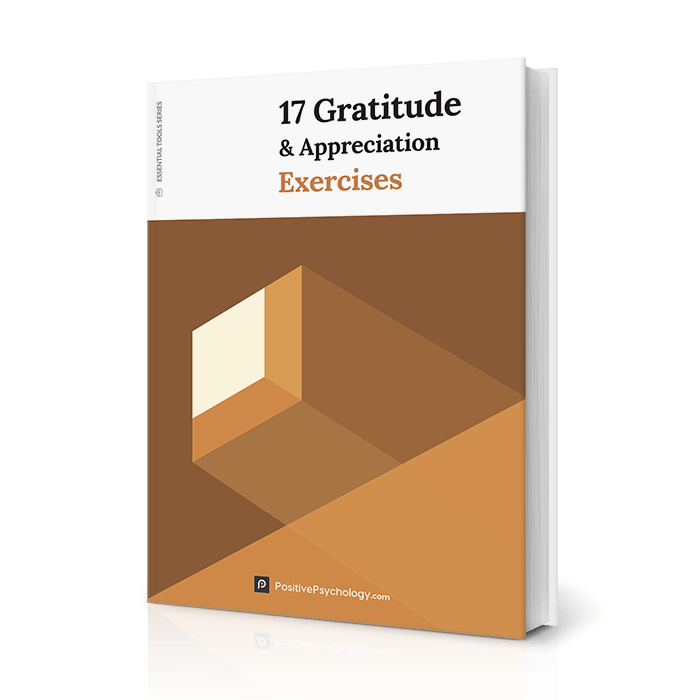

Gratitude is good for us, helping us maintain our mental, emotional, and even physical wellbeing (Brown, 2021).
And it’s no surprise. After all, many of our positive emotions–joy, hope, optimism, and contentment–have appreciation or gratitude in common. And together, they, and others, foster the right conditions for living the ‘good life’ (Seligman, 2011).
Most importantly, gratitude is not fixed. It is a practice we can learn and build upon, something that becomes an integral part of who we are and how we live.
In this article, we explore the value of sending messages of gratitude and introduce guidance and templates to help.
Before you continue, we thought you might like to download our three Gratitude Exercises for free. These detailed, science-based exercises will help you or your clients connect to more positive emotions and enjoy the benefits of gratitude.
“[G]ratitude makes us appreciate the value of something, and when we appreciate the value of something, we extract more benefits from it; we’re less likely to take it for granted,” says Robert Emmons, professor of psychology and gratitude expert at the University of California (cited in Brown, 2021, p. 213).
With gratitude, we become greater participants in our lives, celebrating goodness rather than reacting to it. And what’s more, it’s not passive; it’s something we can invest in and grow, letting it positively impact our relationships and environment (Seligman, 2011; Brown, 2021).
As such, gratitude is a “way of doing, trying, failing, and trying again,” says author and research professor Brené Brown (Brown, 2021, p. 214). We can learn to be equally gracious to ourselves and others and accept that we are a work in progress, attempting to act with gratitude in our daily lives.
But how do you show your gratitude?
Strength expert Ryan Niemiec describes gratitude as when you “regularly experience and express thankfulness,” “don’t take the good things that happen in your life for granted,” and “tend to feel blessed in many circumstances” (Niemiec, 2019, p. 10).
For Professor Martin Seligman (2011), one of the founders of positive psychology, gratitude is enduring thankfulness, with messages of gratitude being expressed to someone that we appreciate as helping or positively influencing our lives and yet have never been properly thanked. It could be as simple as a text message or note given to a friend saying thanks for always being there or a colleague for helping you out of a tight spot.

Seligman asked his students to write and deliver letters of gratitude personally as part of a class exercise.
Because of the many responses he received from the homework and a wealth of findings from controlled studies, he identified that “not only did the writer’s happiness scores go up, their scores on depression were lowered for at least a month following the exercise” (Tomasulo, 2020, p. 129).
While there are several activities surrounding gratitude, letter writing is one of the most commonly researched and validated. And while its positive effect on gratitude, happiness, and wellbeing are profound, it can be summarized by the following three steps (modified from Niemiec, 2018; Seligman, 2011):
Rather than a simple thank you for being there, it is best to create a narrative. It may help to reflect on the following questions (modified from Intelligent Change, n.d.):
How and when did you both meet?
What are your earliest memories of your relationship?
How was your life at the time?
What has that person done for you?
How did that make you feel then and now?
What do they mean to you?
Niemiec (2018) points out that the three steps involve more than the strength, or process of, gratitude alone. Writing and sharing gratitude letters engages other character strengths, such as love, perspective, and social intelligence. And undoubtedly, delivering and reading your letter to that person requires bravery and zest.
Writing such a letter is almost always a valuable exercise, increasing gratitude and other positive emotions. However, we cannot guarantee the response the letter receives. There may be occasions when the activity should finish at step two due to safety issues or the risk of unwanted consequences (Niemiec, 2018).
Whether recently or in our earlier careers, we typically remember those bosses that supported us along our professional path or as we faced difficult times in our personal lives.
Treat the following example as a possible template for use in writing a gratitude letter to your boss (past or present). The details, thoughts, and emotions can be added to, removed, swapped around, or embellished upon as appropriate (modified from Hamadey, 2020).
I’ve been looking back on all stages of my career and thinking of people who made an impact. You are very high up on the list.
I loved working alongside you at [company name] and felt like your talent, experience, work ethic, and creative ideas lifted me up.
You gave me priceless advice that helped me progress through my career.
When my mother was taken ill, you gave me the time I needed to support my family and get back on my feet.
You continue to have my back and offer great advice, referrals, etc.
In short, your guidance and support helped me along my career path, and I’m grateful to you.
As you read through what you have written, consider the feelings that rise up inside you and how the recipient will feel reading your letter.

We don’t always realize everything that our parents have done for us. As we get older, especially when we have children of our own, it can become clear how they deserve our gratitude.
Sending a letter to parents can be a great way of capturing our feelings and sharing our appreciation for them. More personal than the last example, reflect, reuse, and modify some of the following points to capture how you feel about them (modified from Psaila, 2020):
An example might be as follows (modified from MailToSelf, n.d.):
Dear Mum and Dad,
I have been meaning to write this letter for some time. I wanted to thank you for everything you have done for me. You gave me the best possible start in life, supporting me through school and college and helping me through some tough times since. You have always prioritized my needs and shared both tears and laughter.
Thank you for always supporting me and encouraging me to do my best in life. There will never be enough words to convey how much you both mean to me and how grateful I am for you both showing me what unconditional love truly means.
I love you so much, today, and forever.
Our close friends deserve our highest gratitude. They are there when we most need them and can be as close as family – and sometimes more so. While similar to family letters, they may seem more lighthearted and less formal – depending on how you relate to each person, for example (modified from Mayne, 2020):
Dear [friend’s first name]
Friends like you come along once in a lifetime.
I just want you to know how much I appreciate you and your friendship. Whenever I see something that makes me laugh, I want you to be the first to know. It’s wonderful to know that you care enough to stick by my side through the good times and the bad.
You will always be close to my heart!

These detailed, science-based exercises will equip you or your clients with tools to build daily gratitude habits, express more appreciation toward others, and experience more positive emotions in everyday life.
Download PDF
By filling out your name and email address below.
In all its forms, showing gratitude and messages of appreciation should ultimately be unburdening, focusing on positive emotions, memories, and thoughts rather than any wrongdoings (Tomasulo, 2020).
Identifying and using the strength of gratitude, has important valuable associations with other mental and physical factors, including (modified from Niemiec, 2018, p. 12):
Gratitude–both as a strength and an emotion–can be boosted easily with practice. Indeed, gratitude letter writing is so beneficial because research has shown it promotes gratitude, encourages the appreciation of others in your life, and strengthens relationships (Niemiec, 2018).
Teachers react to heartfelt letters from their students - CutWhile writing gratitude letters is an inherently valuable gratitude exercise for both the sender and the receiver, shorter notes (even electronic ones) and cards can be equally powerful. Signature strengths expert, Ryan Niemiec, suggests that you “share your appreciation on a post-it note that you put on someone’s desk as a surprise or send it in a spontaneous email” (Niemiec, 2018, p. 42).
Cards or notes sharing gratitude can be brief – they simply need to be honest and heartfelt. Indeed, it is not necessary to describe everything the person has done for us; it could just be a few sentences as a reminder of when their impact was the greatest and how it made us feel.
Also, while we should try to adopt timely appreciation, there is no statute of limitations on gratitude. A teacher will still be overjoyed to receive a note of thanks from a student from twenty years ago (Hamadey, 2020).

The Positive Psychology Toolkit© is a groundbreaking practitioner resource containing over 500 science-based exercises, activities, interventions, questionnaires, and assessments created by experts using the latest positive psychology research.
Updated monthly. 100% Science-based.
“The best positive psychology resource out there!”
— Emiliya Zhivotovskaya, Flourishing Center CEO
When someone has done so much for us, finding the right words to show our appreciation can be difficult.
The following statements may offer some helpful prompts (Bowlby, 2021; Shutterfly Community, 2022; Berries.com, 2022):

Positive psychology recognizes the importance of relationships. In fact, make up the ‘R’ in Martin Seligman’s model of wellbeing, ‘PERMA’ – the others being positive emotions, engagement, meaningful living, and achievement or accomplishment (Seligman, 2011).
For relationships to be at their best, it is helpful to refocus positively–and with appreciation–on their past, present, and future, especially when going through a tough time. After all, while our relationships have the power to boost wellbeing and increase happiness, they are also “a major part of the cause for people to slip into depression” (Tomasulo, 2020, p. 128). Gratitude can help develop new relationships and maintain existing ones.
Not only that, in a 2005 study, Seligman compared writing gratitude letters with other positive psychological interventions and found they offered the greatest initial increase of happiness.
While gratitude may not cure mental illness, it is a vital, life-enhancing emotion and a practice that can enrich our lives in meaningful ways (Brown, 2021).

Empower others with more hope, satisfaction, and fulfilling relationships with these 17 Gratitude & Appreciation Exercises [PDF] that harness the powerful benefits of gratitude.
Created by Experts. 100% Science-based.
We have many resources available to foster gratitude as an emotion and a strength by improving our skills at increasing and showing our appreciation for others:
Why not download our free Three Gratitude Exercises Pack and try out the powerful tools contained within, including:
Reliving awe moments allows us to re-experience some of the positivity they initially evoked in us. Taking a moment to document awe moments encourages us to savor and enjoy the experience for a little longer and store and recall the memory to re-enjoy positive emotions in the future.
Other free resources include:
More extensive versions of the following tools are available with a subscription to the Positive Psychology Toolkit©, but they are described briefly below:
The following steps can help the client replace thoughts of ingratitude:
Gratitude is the process of (1) acknowledging that one has achieved a positive outcome and (2) recognizing an external source contributed to this positive outcome (Emmons & McCullough, 2003).
This brief ‘check-in’ helps the client connect to their feelings of gratitude. After all, gratitude is more than knowing what you are thankful for; it is also an experience.
If you’re looking for more science-based ways to help others harness the benefits of gratitude, this collection contains 17 validated gratitude tools for practitioners. Use them to help others shift to a more positive mindset and experience the joys of life more deeply.
Gratitude is an emotion, strength, and practice, and it helps us appreciate the value of something. As such, it is something we can learn and build upon, ultimately becoming integral to who we are and our positive relationships with the people and world around us.
To experience gratitude, we must regularly experience and express thankfulness and not take the good things in our lives for granted.
Writing gratitude letters promotes enduring thankfulness, sharing appreciation with those that have positively influenced our lives and yet may have never been properly thanked. Such notes include our feelings towards the recipient, acknowledging what they have done and how they have supported us.
And yet gratitude can be kept brief. It is not necessary to describe everything the person has done, but serves as a reminder of when their impact was the greatest and how it made us feel. Also, while we should try to adopt timely appreciation, there is no statute of limitations on gratitude.
Gratitude letters can help develop new relationships, maintain existing ones, and increase happiness and wellbeing and are a valuable tool for the therapist working with a client or as a standalone practice for self-development.
We hope you enjoyed reading this article. Don’t forget to download our three Gratitude Exercises for free.
Ed: Updated August 2022